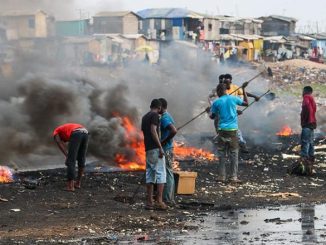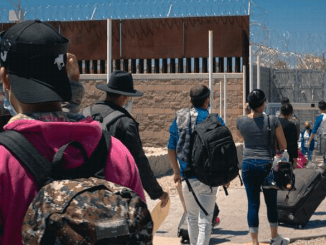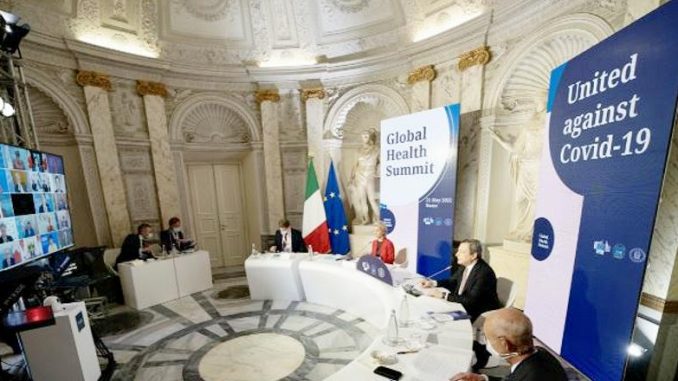
ROME, Italy, May 23, 2021 (ENS) – Leaders of the G20 have committed to a series of actions to accelerate the end of the COVID-19 crisis throughout the world and better prepare for future pandemics. Agreement was reached Friday at an online summit of health ministers co-hosted by European Commission President Ursula von der Leyen and G20 chair Italian Prime Minister Mario Draghi.
The G20 Health Ministers’ Meeting 2021 is one of the ministerial meetings organized as part of the G20 Leaders Summit 2021, which will be hosted by Italy in October. At their videoconference meeting on Friday, the G20 health ministers stressed the need to ensure equitable access to vaccines and to support low and middle-income countries.
“This very first G20 summit on health marks the beginning of a new chapter in global health policy,” President von der Leyen said. The summit concluded with the signing of The Rome Declaration.
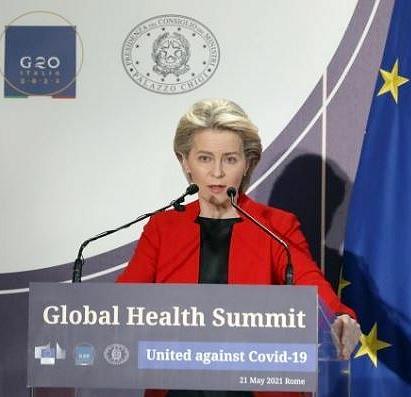
“World leaders strongly committed to multilateralism and global cooperation in health,” she told reporters. “This means, no export bans, keeping global supply chains open and working to extend production capacity everywhere. If we live up to these principles, the world will be better prepared for pandemics.”
The G20 is the international forum that brings together the world’s major economies. Its 20 member nations account for more than 80 percent of world GDP, 75 percent of global trade and 60 percent of the population of the planet. G20 health ministers were joined for this meeting by heads of international and regional organizations, and representatives of global health bodies.
In Rome, the G20 leaders underlined the importance of increased and diversified manufacturing of vaccines and recognized the role of intellectual property in ensuring equity, both through voluntary licensing and knowledge transfer, as well as in the context of the flexibilities provided by the TRIPS agreement. The Agreement on Trade-Related Aspects of Intellectual Property Rights, or TRIPS, is an international legal agreement between all the member nations of the World Trade Organization.
The European Union intends to facilitate the implementation of those flexibilities, in particular the use of compulsory licenses including for exports of COVID-19 vaccines to all countries that lack manufacturing capacity.
The EU will come forward with a proposal in the WTO focusing on:
- – clarifying and facilitating the use of compulsory licences in crisis times like this pandemic
- – supporting the expansion of production
- – trade facilitation and limiting export restrictions
All G20 members acknowledged the need to address the funding gap of the ACT-Accelerator, a global collaboration to accelerate development, production, and equitable access to COVID-19 tests, treatments, and vaccines, and agreed to extend its mandate to the end of 2022. The ACT-Accelerator was launched by the World Health Organization, WHO, the European Commission, France, and the Bill & Melinda Gates Foundation.
By video link, the WHO Director General Dr. Tedros Adhanom Ghebreyesus called on the ministers “to fully fund the ACT Accelerator, as a matter of urgency.”
“The G20 has all the means to vaccinate the world, and the world cannot wait any longer,” Dr. Tedros said, urging the health ministers to “strengthen health security, nationally and globally.”
Thanking the countries that announced generous donations on Friday, Dr. Tedros urged the entire G20 to share more doses faster through COVAX to work towards “the hundreds and millions of doses” we will need in the coming weeks and months.
The vaccine manufacturers made substantial commitments – BioNTech/Pfizer (one billion), Johnson & Johnson (200 million) and Moderna (around 100 million) pledged 1.3 billion doses of vaccines, to be delivered to low-income countries at no profit, and to middle-income countries at lower prices by the end of 2021, many of which will go via COVAX. They committed more than a billion doses for 2022.
Tedros urged the G20 health ministers to “scale-up manufacturing as a matter of urgency, through sharing technology and know-how, and waiving intellectual property provisions, with a focus on Africa,” and also to “drive progress towards universal health coverage in all countries, based on strong primary health care.”
On March 30, a group of world leaders called for an international treaty to improve pandemic preparedness and response for the sake of future generations.
Dr. Tedros said WHO supports “the proposal for a treaty on pandemic preparedness and response.”
“We believe such a treaty would create a high-level framework for political accountability that redefines the way countries deal with health emergencies – and that would encompass all countries, not just the richest and most powerful,” he said. “The treaty could address the challenges we’re facing now.”
“The pandemic has demonstrated that health is not a luxury, but the cornerstone of social, economic and political stability,” Tedros said. “This will not be the last pandemic. We might be able to prevent some, but we cannot prevent them all.”
The G20 leaders further agreed on the need for early warning information, surveillance and trigger systems, which will be interoperable. These will cover new viruses, and also variants of known viruses. They will enable countries to detect much quicker and to act to nip outbreaks in the bud before they become pandemics.
Team Europe presented to the summit concrete contributions to cover immediate needs and to build capacity in the medium term.
The European Commission has worked with industrial partners, which are manufacturing vaccines in Europe, to rapidly make available vaccine doses for low and middle-income countries.
Team Europe aims at donating 100 million doses of vaccines to low and middle-income countries until the end of the year, in particular through COVAX, the global initiative leading efforts to ensure universal and fair access to COVID-19 vaccines.
In addition to covering current vaccine needs, Team Europe will invest to equip Africa to produce vaccines itself. Today, Africa imports 99 percent of its own vaccines. Team Europe has launched an initiative to boost manufacturing capacity in Africa and access to vaccines, medicines and health technologies.
The initiative, backed by €1 billion funding from the EU budget and European development finance institutions such as the European Investment Bank, will cover investments in infrastructure and production capacity, and also in training and skills, supply chains management, regulatory framework.
Under the initiative, a number of regional production hubs will be developed, covering the whole African continent.
To date, the EU has invested €4 billion in COVID-19 research and production capacity to develop vaccines that are now being delivered to the EU and countries across the world. The EU has exported as many vaccines as it has received for its citizens, around 200 million.
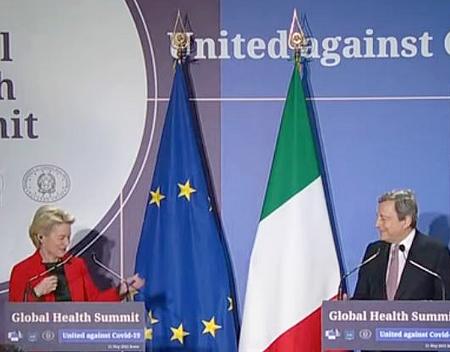
Team Europe has mobilized over €40 billion to support partner countries worldwide in tackling the health emergency, strengthen key sector such as health, water and sanitation and measures to mitigate the socioeconomic consequences of the COVID-19 crisis.
Italian Prime Minister Draghi, who heads the G20 this year, concluded the meeting with a speech backing the Rome Declaration.
“The Rome Declaration rightly defends the role of the multilateral trading system and in particular the central role of the World Trade Organization. We must keep trade flowing across borders and eliminate unjustified commercial barriers and blanket export bans,” he said. “This is essential if we are to react effectively to shocks.”
The Declaration stresses the role of knowledge for overcoming the current and future health crises.
“Scientific ingenuity has opened the path to exit this pandemic,” Draghi said. “The first vaccine was submitted for approval nine months after the WHO declaration of the international emergency that’s been a truly historical achievement.”
“We must continue to invest in our scientists and provide incentives to private companies to do the same,” he said. “Moreover, we must ensure that information is shared rapidly and openly, while preserving adequate protection for intellectual property.”
The G20 is made up of 19 countries and the European Union. The 19 countries are: Argentina, Australia, Brazil, Canada, China, Germany, France, India, Indonesia, Italy, Japan, Mexico, Russia, Saudi Arabia, South Africa, South Korea, Turkey, the United Kingdom, and the United States.
The G20 meetings this year will culminate in the Leaders’ Summit, which will be held in Rome on October 30-31.
Featured image: European Commission President Ursula von der Leyen and G20 chair Italian Prime Minister Mario Draghi host a virtual meeting of G20 health ministers. May 21, 2021 Rome, Italy (Photo courtesy European Commission)
© 2021, Environment News Service. All rights reserved. Content may be quoted only with proper attribution and a direct link to the original article. Full reproduction is prohibited.

